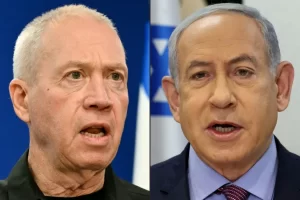The ICC Arrest Warrants for Netanyahu and Gallant: A Global Shockwave

The ICC Arrest Warrants for Netanyahu and Gallant: A Global Shockwave
In a move that has sent ripples across the international community, the International Criminal Court (ICC) issued arrest warrants for Israeli Prime Minister Benjamin Netanyahu and Defense Minister Yoav Gallant. Accusations of war crimes and violations of international law have placed two of Israel’s most prominent leaders under unprecedented scrutiny. This development not only marks a turning point in global accountability but also sparks heated debates over justice, sovereignty, and international relations.
The ICC’s arrest warrants stem from allegations of war crimes committed in the occupied Palestinian territories. Reports detail incidents of disproportionate military actions, targeting civilian infrastructure, and policies that undermine Palestinian sovereignty.
The timing of these charges coincides with mounting international criticism of Israel’s handling of the Palestinian conflict, including recent escalations in Gaza and the West Bank. The ICC’s action reflects growing pressure on global institutions to address what many see as long-standing impunity for leaders accused of violating international law.
Unsurprisingly, the reaction from Israeli leadership has been one of outright denial and defiance. Netanyahu, known for his combative rhetoric, dismissed the charges as politically motivated, labeling them a direct attack on Israel’s sovereignty. Gallant echoed similar sentiments, emphasizing the need for Israel to defend itself against perceived bias in international institutions.
Domestically, the ICC warrants have further polarized Israeli society. Supporters of Netanyahu and Gallant argue that the charges are part of a larger campaign to delegitimize Israel, while critics within the country see this as a wake-up call to address the ongoing human rights issues.
For Palestinians and their advocates, the ICC’s move represents a rare moment of hope in a decades-long struggle for justice. Human rights groups and Palestinian officials have lauded the decision, seeing it as a critical step toward holding Israeli leaders accountable for actions that have perpetuated suffering in Palestinian territories.
However, skepticism remains. Many Palestinians worry that the international community’s historical reluctance to enforce accountability for Israel may render the ICC’s actions symbolic rather than substantive. The road to justice, they argue, requires sustained global pressure and a genuine commitment to upholding international law.
The international response to the ICC’s arrest warrants has been deeply divided.
- Supporters of the ICC: Many nations, particularly in the Global South, have praised the move as a reaffirmation of the principle that no leader is above the law. They argue that the ICC’s actions could set a precedent for addressing war crimes worldwide.
- Critics of the ICC: Conversely, several Western countries, including the United States, have voiced concerns about the ICC’s jurisdiction and its potential impact on peace negotiations in the region. Washington has historically opposed ICC actions against Israel, citing the need to prioritize diplomatic resolutions.
The global debate underscores the tension between the pursuit of justice and the practicalities of international diplomacy.
The arrest warrants for Netanyahu and Gallant are likely to test the limits of the ICC’s authority and its ability to enforce rulings against powerful states.
Israel is not a signatory to the Rome Statute, the treaty that established the ICC, raising questions about how the court can compel compliance. Moreover, the strong backing of Israel by influential allies like the United States complicates the ICC’s efforts to pursue accountability.
This case also highlights the broader challenges facing international justice mechanisms. Critics argue that the ICC has historically struggled to act impartially, often focusing on smaller or less politically connected nations. The Netanyahu-Gallant case could either reinforce perceptions of bias or mark a turning point in the court’s pursuit of universal justice.
The ICC’s actions against Netanyahu and Gallant bring to light the broader issue of accountability in a world where power often shields leaders from consequences. Whether addressing war crimes, corruption, or human rights abuses, global institutions frequently grapple with double standards and political interference.
This case forces the international community to confront difficult questions: Can justice be truly blind when geopolitics are at play? How can international law balance sovereignty with the need to protect human rights? The answers to these questions will shape not only the outcome of this case but the future of global justice.
The ICC’s arrest warrants for Benjamin Netanyahu and Yoav Gallant represent more than just a legal proceeding—they symbolize a clash between the pursuit of accountability and the realities of international politics. While the path forward remains uncertain, this development has sparked a global conversation about justice, power, and the role of international institutions in holding leaders accountable.
Whether these warrants lead to tangible action or remain symbolic, they have already reshaped the narrative around Israel, Palestine, and the international community’s commitment to human rights. For better or worse, the world will be watching as this unprecedented chapter in global justice unfolds.
Do you find Tmaq Media useful? Click here to give us five stars rating!



















